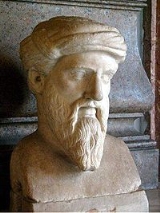
Greek philosopher
, mathematician
, and founder of the religious movement called Pythagoreanism
. Most of the information about Pythagoras was written down centuries after he lived, so very little reliable information is known about him. He was born on the island of Samos
, and might have travelled widely in his youth, visiting Egypt
and other places seeking knowledge. He had a teacher named Themistoclea
, who introduced him to the principles of ethics
.
I was Euphorbus|Euphorbus at the siege of Troy.![]()
By the air which I breathe, and by the water which I drink, I will not endure to be blamed on account of this discourse.![]()
Dear youths, I warn you cherish peace divine, And in your hearts lay deep these words of mine.![]()
The soul of man is divided into three parts, intelligence, reason, and passion. Intelligence and passion are possessed by other animals, but reason by man alone.![]()
We ought so to behave to one another as to avoid making enemies of our friends, and at the same time to make friends of our enemies.![]()
In anger we should refrain both from speech and action.![]()
Reason is immortal, all else mortal.![]()
The most momentous thing in human life is the art of winning the soul to good or to evil.![]()
Friends share all things.![]()
Power is the near neighbour of necessity.![]()

